
Office Feng Shui 2025: Tips for Creating a Harmonious and Productive Workspace
Table of Contents
- 1. Feng Shui Desk Placement for Success
- 2. Embrace Natural Light and Fresh Air
- 3. Incorporating Color for Harmony and Productivity
- 4. Clutter-Free Office for Flowing Chi
- 5. The Wealth Corner: Attracting Prosperity
- 6. Using Mirrors and Reflective Surfaces
- 7. 2025 Office Feng Shui in the West and East
- FAQs
- Conclusion
Feng Shui is a timeless practice that helps optimize the flow of energy (Chi) in a space, creating balance, improving productivity, and fostering overall well-being. As we enter 2025, it’s important to apply Feng Shui principles to our office spaces—whether at home or in a traditional workplace—so we can achieve not just a functional but an energetically supportive environment. This guide will explore key elements of Feng Shui 2025 that will help you arrange your office for success, from desk placement to color choices and beyond, including a look at a home office Feng Shui setup.
1. Feng Shui Desk Placement for Success
The placement of your desk is a foundational Feng Shui 2025 placement element that impacts your energy flow and overall productivity. A key Feng Shui concept is the "command position," which encourages a sense of control and stability.
Why is the command position important?
In Feng Shui, this is about your desk facing the door so you can see who enters the room without being directly in line with the door. This positioning symbolically empowers you to face the challenges and opportunities coming your way while maintaining a sense of security. By being aware of your surroundings, you prevent feelings of vulnerability, which can hinder your focus.
If it’s not possible to place your desk directly in the command position, you can work around it by using mirrors or reflective surfaces to allow you to see the entrance. Alternatively, a low partition or screen can also be helpful for creating a sense of protection.

The ideal desk should:
- Face the door, but not be directly in line with it (avoid sitting with your back to the door).
- Be against a solid wall or backdrop to provide support. For more on the desk against the wall positioning, see this guide.
- Have clear space around it to allow for the free flow of Chi.
- Keep items organized to avoid clutter and promote focus.
The desk should be solid and substantial, symbolizing a firm foundation for your work and career growth. Avoid sitting directly under overhead beams or a slanted ceiling, as these can create a feeling of oppression, restricting the flow of energy and making it harder to concentrate.
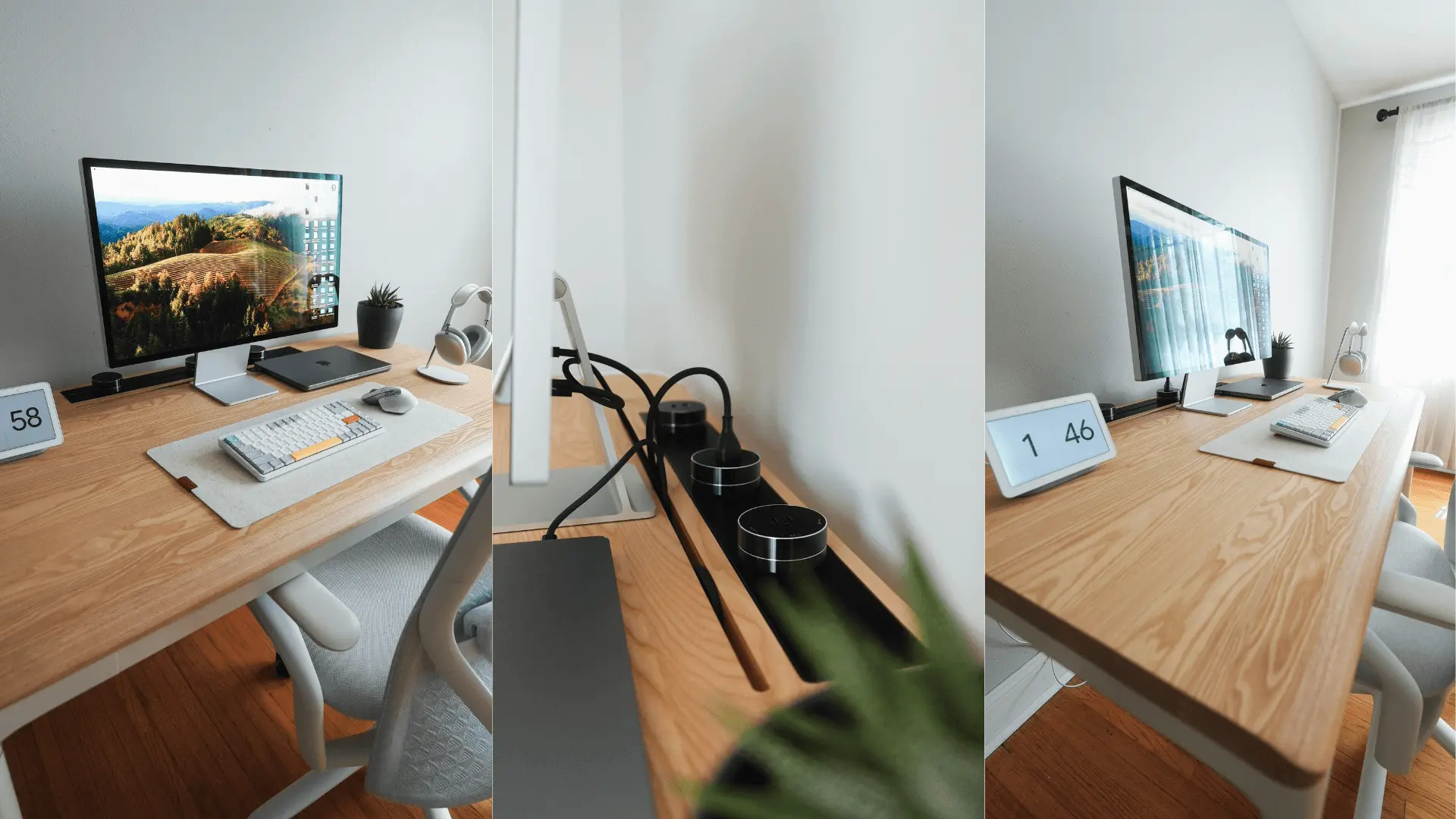
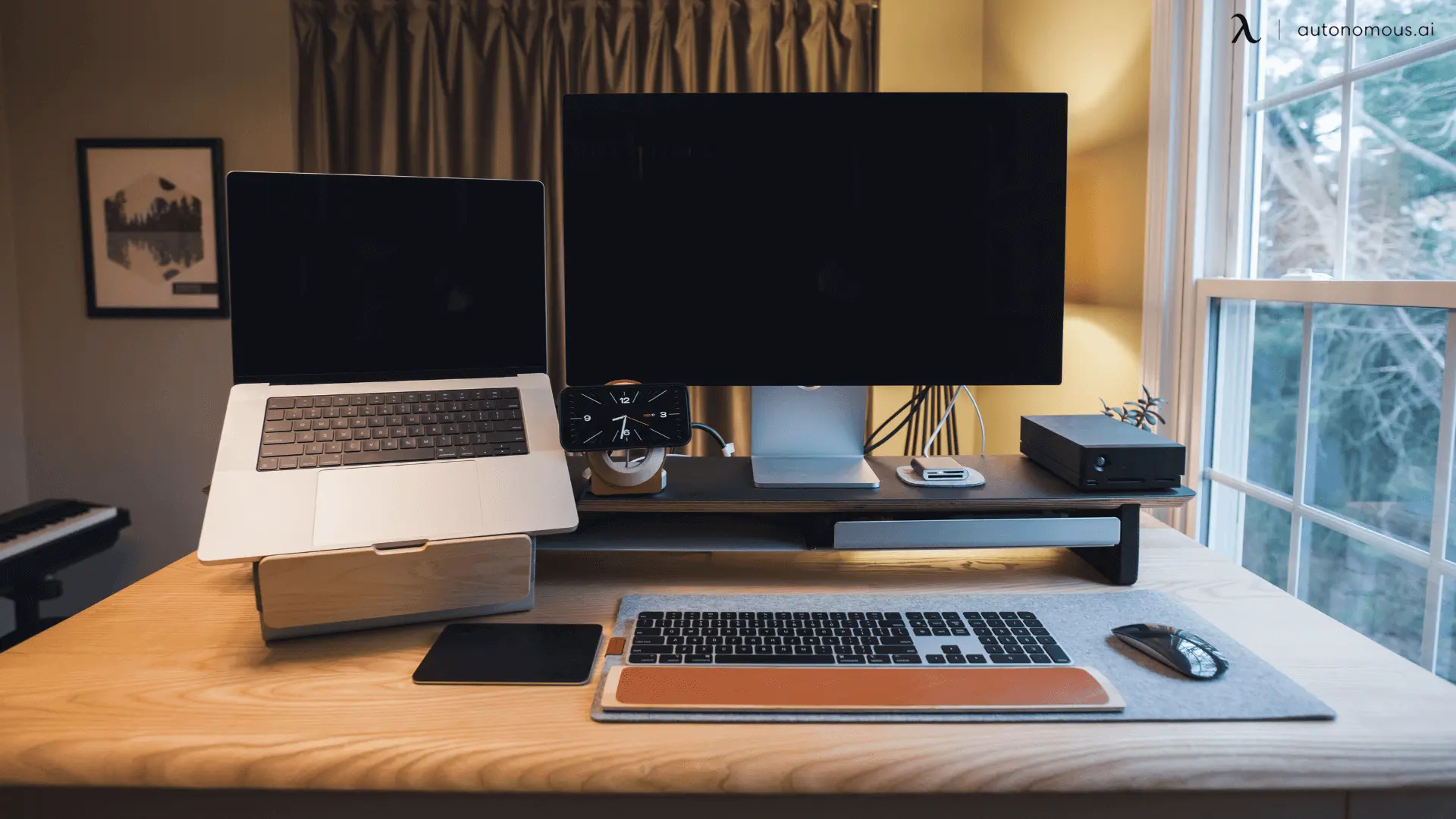
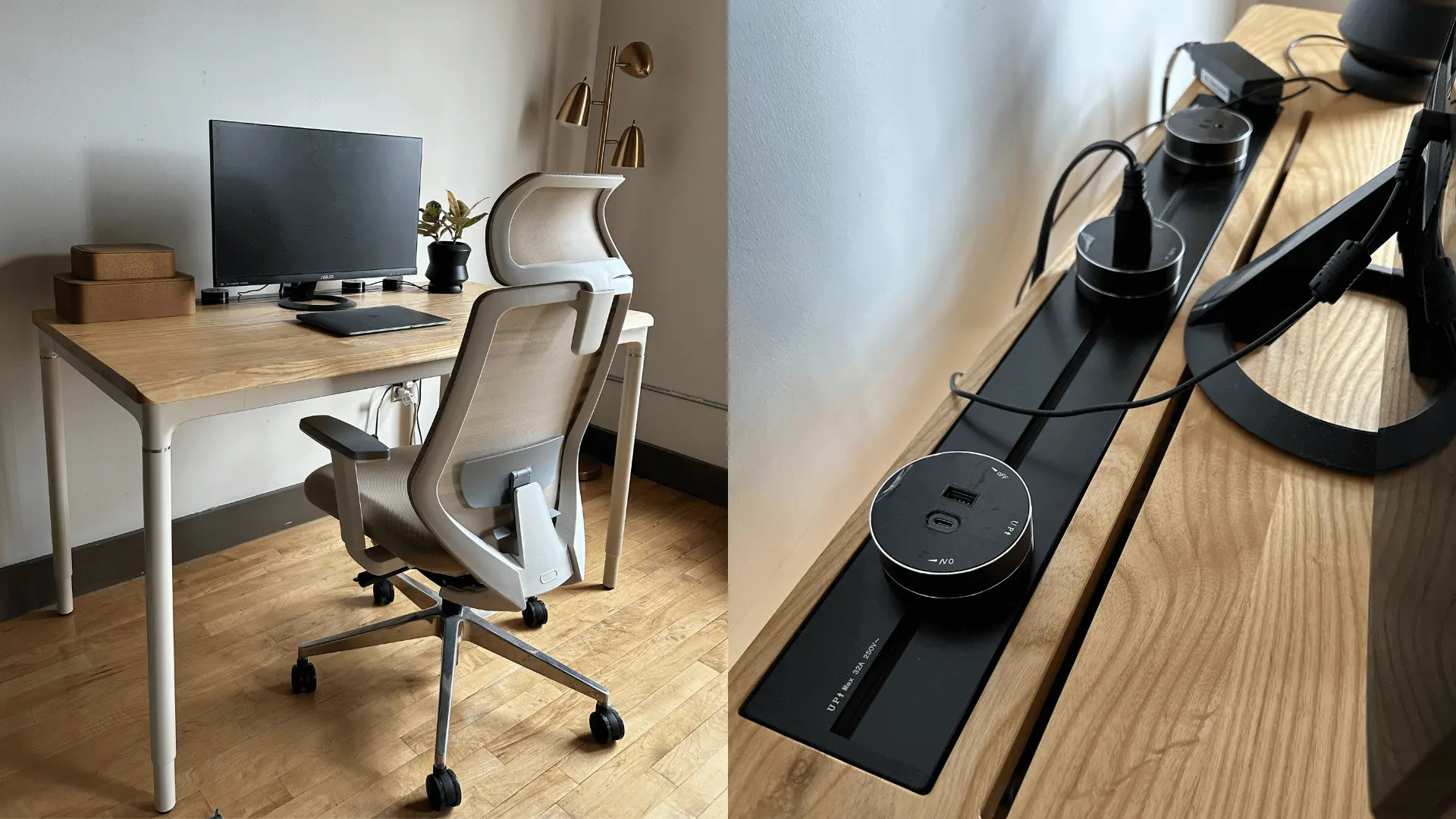

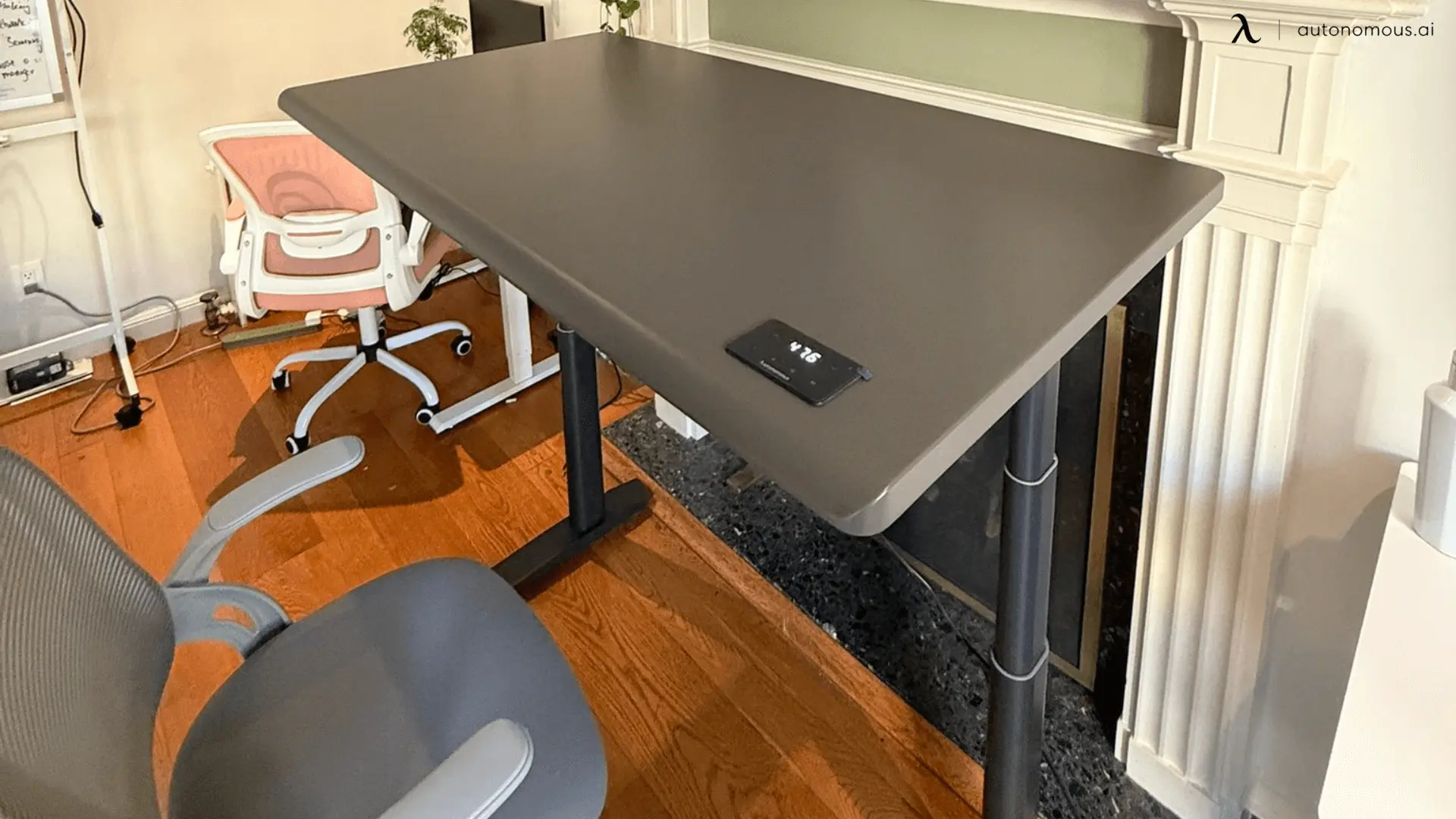

For further tips on Feng Shui desk placement, and how it aligns with Feng Shui bedroom with desk arrangements, check out these resources.
Additionally, consider adding lucky plants for office desks to enhance the space, and explore the benefits of an L-shaped desk office layout for Feng Shui for a more efficient workspace setup.


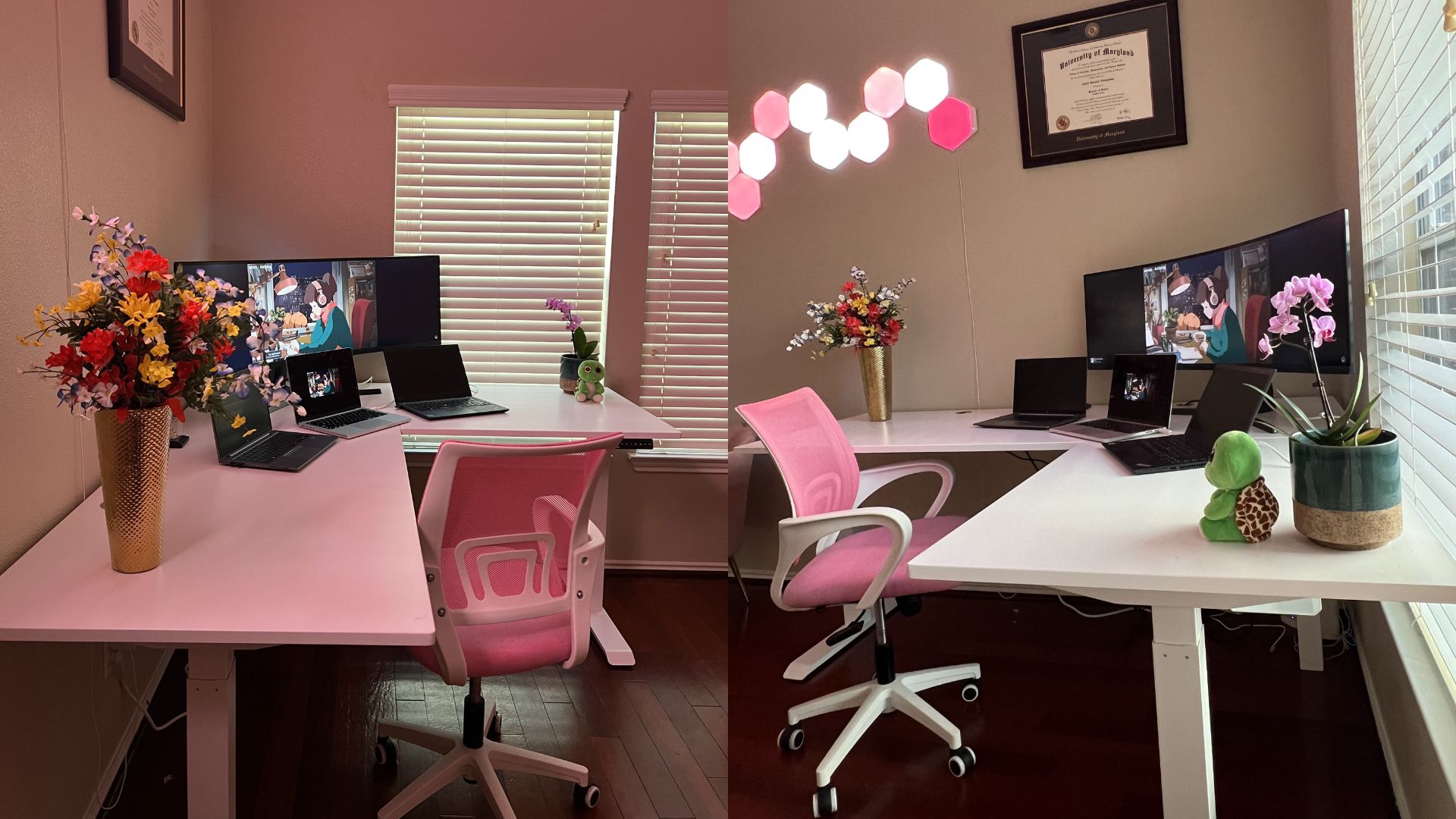
2. Embrace Natural Light and Fresh Air
Natural light and fresh air are essential to creating a vibrant and positive atmosphere in any space, but they are especially important in the office. In Feng Shui, natural light symbolizes vitality, optimism, and clarity, while fresh air ensures the free flow of Chi. These elements are vital for maintaining both physical and mental well-being.
Why Is Natural Light Important?
Natural light energizes a space, bringing life and vitality. Prolonged exposure to artificial lighting can lead to fatigue, stress, and decreased productivity. Sunlight helps balance your circadian rhythm, boosting mood and improving focus, which in turn enhances work efficiency. It’s also associated with prosperity and abundance, which naturally attracts positive energy into your workspace.
The Role of Fresh Air in Feng Shui
Fresh air is just as important. In Feng Shui, stale, stuffy air can create stagnant energy, negatively affecting mental clarity and overall health. Chi thrives in an environment with good airflow, which is why air purifiers and open windows are essential for maintaining good energy.
Evolving Trends in Sustainability and Natural Elements
| Year | Focus on Sustainability | Natural Light & Fresh Air |
|---|---|---|
| 2023 | Sustainability was secondary, with a focus on functionality and comfort. Eco-friendly materials were used sparingly. | Feng Shui emphasized creating calm, functional spaces. Natural light was encouraged, but not as a central aspect. |
| 2024 | Sustainability gained momentum, with more businesses using eco-friendly materials and promoting environmental responsibility. | Feng Shui encouraged natural materials like wood, and recycling furniture to create harmonious and environmentally responsible spaces. |
| 2025 | Sustainability is now central, with an emphasis on eco-friendly practices. Energy-efficient lighting, sustainable materials, and low-waste practices are standard. | Natural light and fresh air are integral to creating a balanced space. The use of plants, energy-efficient windows, and air purifiers are standard to ensure a constant flow of Chi. |
How to Incorporate Natural Light and Fresh Air in Your Office:
By bringing more natural elements into your workspace, you create a dynamic and balanced environment. Here are some simple tips for optimizing your office with natural light and fresh air:
- Position your desk near windows to maximize exposure to daylight. For tips on Feng Shui office layout with window, see this guide.
- If natural light is limited, use full-spectrum light bulbs to mimic daylight.
- Open windows whenever possible or invest in air purifiers to improve air quality.
- Incorporate plants known for purifying the air, like peace lilies, spider plants, or bamboo.
The 2025 Approach: Maximizing Natural Elements for Productivity
By embracing sustainability and bringing natural light and fresh air into your workspace, you not only enhance your energy levels but also support your mental clarity and well-being. In Feng Shui 2025, it’s essential to design an office that not only minimizes your environmental footprint but also maximizes the flow of Chi through natural elements like plants, stone, and wood.
3. Incorporating Color for Harmony and Productivity
Color plays a significant role in Feng Shui, not just for aesthetic appeal, but also for influencing the energy and mood of a space. The right color choices can enhance calmness, creativity, focus, and success, all of which are essential for a productive workspace. As we move into Feng Shui 2025, color becomes even more important for mental well-being and productivity.
How Color Trends Have Evolved Over the Years
| Year | Focus on Color | Feng Shui Color Significance | Recommended Colors |
|---|---|---|---|
| 2023 | Neutral tones dominated, focusing on calm and clean environments. | Color was used sparingly, with emphasis on creating a neutral backdrop for focus. | Grays, whites, beiges. |
| 2024 | Deeper, richer hues introduced to evoke grounding and creativity. | The focus shifted to using color to balance energy and foster creativity. | Terracotta, deep greens. |
| 2025 | Color becomes a central tool for mental well-being and productivity. | Colors like blue and green are used for calming effects and focus. Earthy tones continue to ground the space. | Soft blues, greens, earthy tones (browns, beiges, terracotta). |
Feng Shui Colors and Their Benefits
Blue: Blue is known for its calming and restorative qualities. In modern blue office, it promotes mental clarity and focus, making it ideal for a workspace. Blue also symbolizes trust, which is essential in any professional setting. It’s particularly useful for reducing stress and enhancing concentration. For more information, see the Feng Shui color for office guide.
Green: Dark green home office design represents renewal, growth, and vitality. It brings balance and harmony to a space, making it perfect for boosting creativity. In Feng Shui, green fosters innovation and supports both personal and professional growth, making it a great choice for brainstorming sessions or creative work.
Earthy tones (such as browns, beiges, and terracotta) are grounding and stabilize energy. These colors help create a calm, balanced environment, reducing anxiety—especially in high-stress work situations. They connect you to the earth, helping you feel secure and centered in your space.
For more on home office colors and how they can enhance your work environment, see this guide. Additionally, check out the Feng Shui color of the year 2024 for insights into the most current color trends in Feng Shui, and how to incorporate them into your office.
In Feng Shui 2025, color is not just about visual appeal—it’s a powerful tool for balancing your environment, promoting productivity, and creating a space that supports your professional and personal growth.
4. Clutter-Free Office for Flowing Chi
In Feng Shui, a cluttered workspace directly disrupts the flow of Chi, creating stagnant energy that can affect focus and productivity. Feng Shui considers clutter to be a physical manifestation of mental clutter, leading to confusion, stress, and a decrease in clarity. To maintain a harmonious and balanced workspace, it's essential to keep things organized and clear.
Why Is a Clutter-Free Office Important?
Keeping your office organized ensures that energy flows freely, allowing you to focus on your work without distractions. A clean and tidy workspace promotes mental clarity, reduces feelings of overwhelm, and fosters a sense of peace. In Feng Shui, clutter is associated with blocked or negative energy. Therefore, maintaining an organized workspace is vital to inviting positive Chi and creating an environment conducive to success and well-being.
Evolution of Technology in Feng Shui
| Year | Technology's Role in Feng Shui | Focus of Feng Shui |
|---|---|---|
| 2023 | Technology played a secondary role, enhancing comfort and ergonomic efficiency. | Focused on improving office furniture with basic tech tools like adjustable desks and lighting. |
| 2024 | Smart technology became mainstream, including adjustable desks, smart lighting, and noise-cancelling devices. | Feng Shui began aligning technology with energy flow to reduce distractions and improve comfort. |
| 2025 | Technology is now an integral part of the design process, including smart lighting, AI-powered furniture, and air purifiers. | Technology is seen as essential for enhancing the natural flow of energy, supporting both physical and energetic balance. |
Tips for Maintaining an Organized Office:
To ensure that your office remains clutter-free and supports a smooth energy flow, here are some practical tips:
- Regularly declutter your desk and storage areas.
- Keep only the essentials on your desk—things you truly need or that inspire you.
- Invest in storage solutions that allow easy access to documents and supplies, but keep them out of sight.
- Organize cables and wires to avoid visual clutter.
When working in a shared office, Feng Shui principles can help ensure that both individual and collective energy flow smoothly. For insights into creating an office layout that aligns with these principles, consider exploring this guide to Feng Shui office layout to design a space that enhances collaboration and promotes a positive, balanced work environment.
5. The Wealth Corner: Attracting Prosperity
One of the most well-known Feng Shui 2025 principles is the "wealth corner", located in the far left corner of your office when you are standing at the door. This area is said to hold the key to attracting financial success and prosperity.
Why is the wealth corner important?
In Feng Shui, prosperity is linked to how well the energy flows in a space. The wealth corner activates the flow of abundance and opportunity, so it's crucial to keep this area clean, clear, and energized.
How to activate the wealth corner:
- Place objects that symbolize abundance and growth, such as plants (preferably in good condition), crystals (such as citrine), or a small water feature.
- Use colors like purple, gold, and green in this area to attract wealth and opportunity.
- Avoid placing clutter or broken items in the wealth corner, as they can block the flow of prosperity.
For those working in office cubicles, applying Feng Shui principles can also help optimize the space for prosperity. Check out this guide on how to decorate your office cubicle with Feng Shui to improve your workspace and create an environment that supports both financial and personal growth.
6. Using Mirrors and Reflective Surfaces
Mirrors are powerful tools in Feng Shui, helping to enhance the flow of energy and promote a feeling of spaciousness. In your office, mirrors can reflect light, bring a sense of openness, and boost positive energy.
Why are mirrors important?
Mirrors expand a space and allow the Chi to flow freely, especially in smaller or confined rooms. However, mirrors must be placed thoughtfully—reflecting something positive or uplifting, such as plants or artwork. You may need to understand Feng Shui mirror placement for good luck to ensure optimal energy flow.
How to use mirrors effectively:
- Place mirrors where they can reflect natural light or items that inspire you.
- Avoid placing mirrors directly facing your desk, as it can create distractions and confusion.
- Use mirrors to reflect plants or water features to enhance the flow of prosperity and vitality.
Mirrors can be a useful tool to expand the energetic flow of your office and improve the quality of Chi.
7. 2025 Office Feng Shui in the West and East
The year 2025 introduces new interpretations and focuses for Feng Shui office arrangements, influenced by both traditional Eastern principles and Western adaptations. While the foundation of Feng Shui remains the same, regional perspectives bring unique priorities to the practice.
7.1. Feng Shui in the East: Tradition Meets Modernity
In Eastern cultures, Feng Shui continues to emphasize the balance of the five elements—wood, fire, earth, metal, and water. For 2025, the focus shifts toward:
- Sustainability and Natural Elements: Bamboo furniture, wooden desks, and air-purifying plants remain central to aligning with nature.
- Wealth Corners: Greater emphasis is placed on activating the southeast corner with gold accents or water features, symbolizing prosperity.
- Traditional Symbols: Incorporating Chinese zodiac influences, such as dragon or snake motifs, to align with 2025’s energy cycle.
Eastern Feng Shui often integrates ancestral respect into workspace design, such as maintaining a small altar or space for personal reflections, even in professional settings.
7.2. Feng Shui in the West: Adaptation and Minimalism
In the West, Feng Shui for 2025 leans toward modern interpretations, blending aesthetics with functionality:
- Minimalist Designs: Western offices adopt a clean, clutter-free approach with sleek furniture that aligns with energy flow.
- Ergonomics and Well-being: There’s a stronger focus on ergonomic setups—adjustable desks and chairs that enhance physical health while maintaining Chi balance.
- Individual Energy: Western practices emphasize personal energy alignment, encouraging the use of crystals, motivational artwork, or personalized desk setups to enhance productivity.
- Collaborative Spaces: Feng Shui principles are applied to create harmony in shared offices, emphasizing open layouts and communal seating arrangements.
Both perspectives share common goals—creating a workspace that promotes harmony, balance, and productivity. While Eastern practices retain a deep connection to tradition, Western adaptations lean into practicality and personal expression, making Feng Shui accessible to diverse workplaces.
FAQs
What is the command position in Feng Shui, and why is it important?
The command position refers to the placement of your desk where you can see the door without being directly in line with it. This position is important because it gives you a sense of control over your environment, helps you stay alert, and prevents feelings of vulnerability. It’s believed to enhance focus, decision-making, and overall productivity.
How does color affect Feng Shui in the office?
Color plays a significant role in Feng Shui by influencing mood, energy flow, and productivity. Soft blues promote calmness and focus, green enhances creativity and growth, and earthy tones create stability and grounding. Choosing the right color for your office helps to align the space with your professional and personal goals.
Can Feng Shui really help attract prosperity and wealth?
Yes, according to Feng Shui, the strategic arrangement of objects and furniture can influence the flow of prosperity. The "wealth corner" of your office, typically in the far left corner when standing at the door, can be activated with objects like plants, crystals, and water features. Keeping this area clean and energized helps to invite positive financial opportunities and growth.
What types of plants are best for Feng Shui in the office?
In Feng Shui, plants are considered vital for enhancing energy flow and promoting a positive environment. Ideal plants for the office include peace lilies, snake plants, and bamboo. These plants are known for purifying the air, adding vitality, and balancing the energy in the room.
How can I apply Feng Shui principles to a small office or home office?
Even in small spaces, Feng Shui can have a significant impact. Start by keeping your workspace organized and clutter-free, positioning your desk in the command position, and incorporating natural elements like plants or mirrors. Opt for light colors to make the space feel larger and use vertical storage to maximize space while maintaining energy flow.
Is it necessary to use Feng Shui for both home and office spaces?
While Feng Shui principles can be applied to any space, using them in both home and office environments ensures harmony between personal and professional life. A balanced environment in both areas promotes mental clarity, reduces stress, and supports overall well-being.
How often should I declutter my office for optimal Feng Shui?
Regular decluttering is essential to maintain the flow of positive energy. It’s recommended to declutter your office at least once a week to prevent stagnant energy from accumulating. Keep only essential or inspirational items visible on your desk and store paperwork, supplies, and unnecessary items out of sight.
Conclusion
Feng Shui is not just about arranging furniture—it's about creating an environment that supports your goals, enhances your productivity, and fosters your well-being. By applying Feng Shui 2025 principles to your office, you can cultivate a workspace that encourages focus, attracts prosperity, and promotes a balanced, harmonious atmosphere.
Remember, small adjustments—like proper desk placement, using color strategically, incorporating plants, and maintaining an organized space—can have a profound impact on the energy of your office. Whether you work from home or a corporate setting, a Feng Shui-informed office setup can help you feel more in control, motivated, and inspired to achieve your personal and professional goals.
Embrace these simple, practical Feng Shui techniques to optimize your workspace and step into 2025 with a renewed sense of clarity, productivity, and success. For those also interested in Feng Shui for other areas, explore the Feng Shui living room rules and how to create the ideal Feng Shui study room.
Get exclusive rewards
for your first Autonomous blog subscription.
Spread the word
You May Also Like
/https://storage.googleapis.com/s3-autonomous-upgrade-3/production/ecm/240610/1(11)3b463479-3290-404c-ad1d-6853ec654e71.jpg)


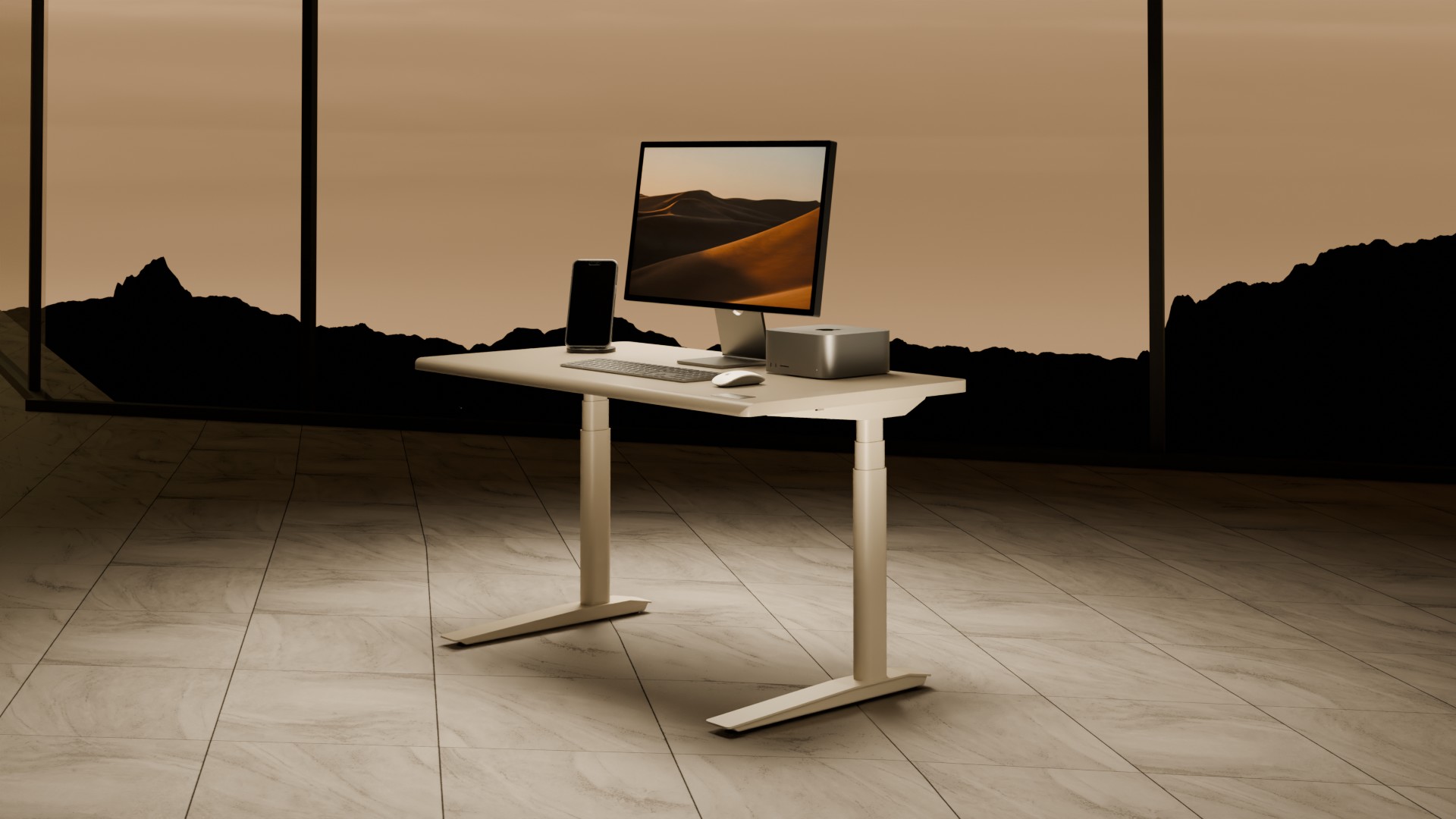

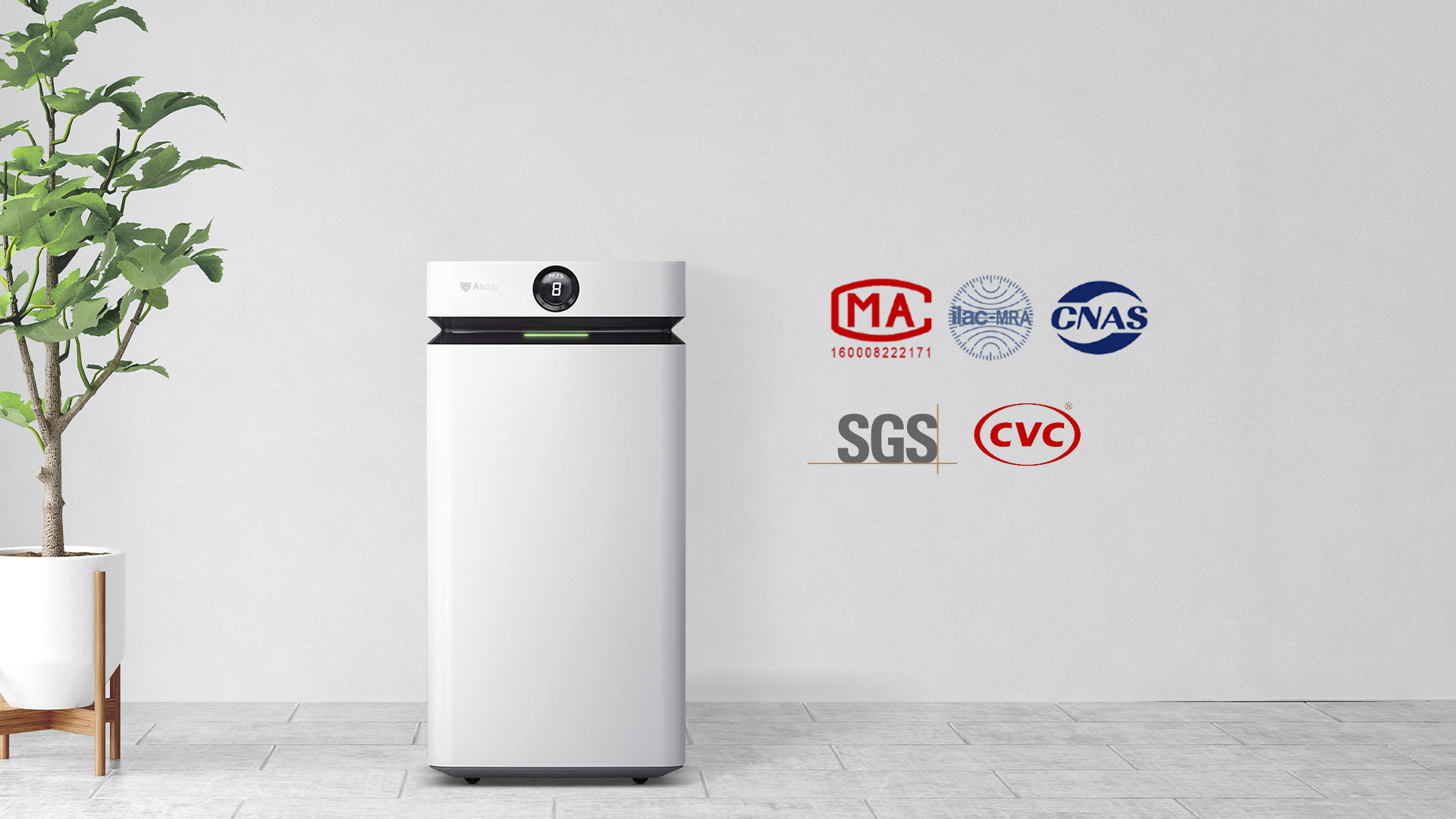
/https://storage.googleapis.com/s3-autonomous-upgrade-3/static/upload/images/customer/image-1_1655714085.jpg)

/https://storage.googleapis.com/s3-autonomous-upgrade-3/static/upload/images/product/galleries/31.85--1507263898964.jpg)
/https://storage.googleapis.com/s3-autonomous-upgrade-3/static/upload/images/customer/5-4_1681374988.jpg)
/https://storage.googleapis.com/s3-autonomous-upgrade-3/production/ecm/231213/4(6).jpg)



/https://storage.googleapis.com/s3-autonomous-upgrade-3/static/upload/images/customer/croppedimage-2_1667846080.jpg)




-7512dd9e-3510-42ed-92df-b8d735ea14ce.svg)


